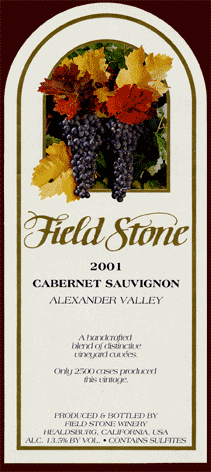|
|

theCompass mobile application is a winery, brewery, and distillery locator for North America. |
|
|
Field Stone Winery

|
|
One of the most frequently asked questions we hear in our tasting room, especially now that we have released our new estate Syrah is, "Is 'Petite Sirah' the same as 'Syrah'?" Our answer has to be,"Yes, and No, depending on what you mean by same." If you mean same in the all-important sensory sense, ("In a blind tasting can I really tell which is Syrah and which is Petite Sirah?") the answer is no. Here is a story that might convince you. In 1984 I had the pleasure of attending a meeting of the Manhattan Park East Chapter of the Les Amis du Vin, an experienced group of New York wine connoisseurs known especially for their knowledge of French wines. John Salvi, a distinguished Master of Wine, had prepared a blind tasting of Rhone Syrahs and California Petite Sirahs. In his introduction Mr. Salvi praised the lowly California Petite Sirahs but believed that Chapter members would have no trouble distinguishing them from the "true, noble French Syrahs." When the vote for best wines was finally taken and each winner in order came out of its brown bag, the #1 wine of the tasting—thought by all to be a French Syrah—was a Field Stone 1979 Petite Sirah! The distinguished group had rated Field Stone's Petite Sirah higher than the famed Guigal Cote Rotie "La Mouline" (#2), the celebrated Chateauneuf du Pape Domaine du Grande Tinel (#3), and the respected Guigal Hermitage (#4). To my surprise and delight I received a gracious standing ovation. I learned two things that evening: first, quality-wise my Petite Sirah is definitely not 'petite'—he can compete very well with the big French boys; second, at the sensory level one is hard put to distinguish the two varieties.
Where then is the difference implied by the two names? Let me tell you about the genetic parentage of each grape variety. The grape known as Syrah (which migrants took to Australia in the 1900's and called Shiraz) has a long history from its ancient Near Eastern origins to more recent cultivation in the Rhone region of France. In the late nineteenth century a variety thought to be related to Syrah was brought to California where it thrived alongside other Rhone varieties. The mystery of its true relation to Syrah was not settled until the 1990's by the studies of Dr. Carole Meredith of UC Davis. Her DNA analysis of Petite Sirah grapes taken from old California vineyards (similar to our planting of 1894) concluded that they matched a Rhone variety called Durif. In the 1880's at the University of Montpellier, a researcher named Durif had developed a red variety with very tight clusters to thwart the threat of powdery mildew. He successfully crossed two Rhone varieties of the same species: Syrah, the father (or pollinator), and Peloursin, the mother. Because Syrah and Peloursin are of the same species, their son, Petite Sirah, is a cross and not a hybrid. So, is the old maxim, "Like father like son," true? I'll let you make the decision. At Field Stone you have a good choice: You can compare
|
|
|
Directions
View Map
|
View Weather
Cabernet Sauvignon - Alexander Valley
Dubbed already by Valley insiders as "a keeper" (referring to its ageing potential), this big, extractive '01 begins with seductive, spicy varietal aromas. Its complex flavors (Bing cherries, plums, and crushed blackberries) are rich, and ripe, with characteristics typical of Field Stone's definitive "Alexander Valley Style": rich fruit forward, with attractive notes of oak that never dominate. The intense fruit core carries through in a powerful finish still in its developing stage. This is a Cabernet that can be enjoyed now with great pleasure, while its "forgiving tannins" bespeak its outstanding ageing potential for ten to fifteen years.
|
Chardonnay - Russian River Valley
This 2003 Chardonnay expresses well the trademark house style for which Field Stone has become known: ripe, up-front varietal fruit flavors and aromas harmoniously married to, but never dominated by, toasty oak. This is a full-bodied and multi-dimensional Chardonnay, which upon release has shown generous notes of peach, apple and pineapple on the palate and a touch of nutmeg in the lingering finish. These clean, appealing fruit and spice components are accompanied and enriched by a light, butter-cream element from the wine’s malolactic heritage
|
Convivio Cabernet Sauvignon
Fruit for our new Convivio Cabernet comes from a celebrated 33 year old block called Old Hoot Owl Vineyard and one of our new estate blocks planted to recently acquired French clones. This marriage of fruit from fully mature and exciting new vines gave us the ability to produce a wine of both substance and value. Here is a deliciously full-fruited Field Stone Cabernet priced for everyday enjoyment and where, in the price, you also have an opportunity to give back something to our farmworking families. Enjoy. Give thanks. Convivio!
|
Convivio Semillon
Our Convivio Semillon comes from an ideal dry-farmed block owned by the Osborne family just north of our vineyard estate in Alexander Valley. With careful tending before and during September's hot spells these old head-pruned vines can yield outstanding fruit with complex flavors and aromas. 2003 was an excellent vintage for this Bordeaux variety giving us extra-concentrated fruit characteristics of ripe pear, apple and fig. Known for its unctuous, full-flavored mouth-feel and long finish this Semillon will not disappoint you—neither will its price!
|
Field Stone Convivio Sangiovese
As we prepared for the crush of our first Sangiovese in 1997 we were convinced that the vinification protocols used by many early California Sangiovese producers did not fit the grape. Vinification of Sangiovese requires a different approach than what we have been used to with our Bordeaux and Rhone varietals. Given the characteristics of the variety we believed that it demanded handling more akin to Pinot Noir and that the use of new oak should be restrained allowing its crisp, bright, fruit character to shine forth. We think you’ll agree when you try this striking ’01 release with its dark ruby color, its richly spiced strawberry aromas, its deep, lingering flavors of cherry and dark plum, and its delightfully crisp finish. We also think you’ll discover with us and our Tuscan friends why Sangiovese has become one of the most deliciously versatile red food wines in the world.
|
Merlot - Alexander Valley
Our inaugural release is a deeply extracted, full-bodied Merlot with an expressive, fruit forward style. The aromas and flavors are ripe red currant, cherry, and plum, a bit tightly packed initially and yielding fully with gentle aeration. Though a full-bodied Merlot, its fine, supple tannins allow this keeper to be enjoyed now. With careful cellaring, this wine should evolve in complexity and mature even further over the next three to six years. It also has the stuffing to age beautifully for many good years beyond.
|
Sauvignon Blanc
|
Staten Family Reserve Cabernet Sauvignon
|
Staten Family Reserve Petite Sirah
Field Stone’s Petite Sirah has been placed by critics in the same class as the finest Cabernet Sauvignons and rightfully is taking its place as one of the Sirahs on restaurant wine lists. Deep, rich, yummy, and smooth, this complex wine will become more fully integrated in the next three to five years on its way to full maturity over at least the next decade. Our long-time consultant, André Tchelistcheff, who loved this wine, often referred to it as the “wine of the angels,” in tribute to its glory and long ageing potential.
|
Staten Family Reserve Petite Sirah Vintage Port
In 2002 we had the makings of a terrific vintage Port. After crushing, the must was fermented in a small open-top fermenter which allowed for frequent, gentle, hand punchdowns. At the right sugar level we stopped fermentation with an addition of high proof brandy. Following pressing the Port was aged in neutral French oak for months and then prepared for unfiltered bottling. The results were outstanding.
Once again here was a vintage that gave us a memorable fortified dessert wine with deep, concentrated, expansive black cherry aromas, rich fruit flavors of blackberries and plums, and a velvety long-lasting finish. Although its fans will pull the cork to enjoy early, this is a wine that possesses great ageing potential. Only 196 cases were produced this vintage.
|
Syrah
|
Add New Review
|
|